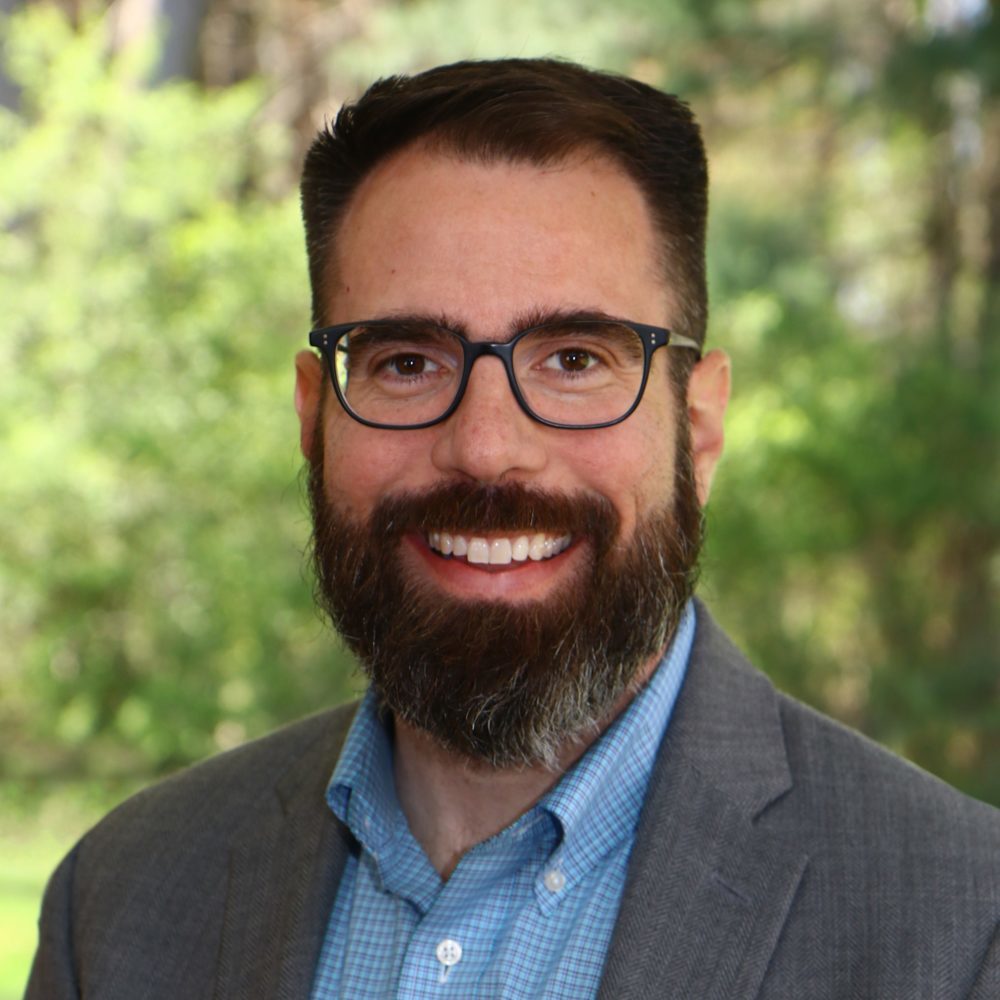Diocese of Columbus Working with CLI to Revitalize Evangelization in Ohio
Dear Friends,
As Catholic Leadership Institute walks alongside Church leaders, it is a joy to have you join us through your prayers and philanthropy.
I invite you to revisit our work in the Diocese of Columbus as they walk further into their mission to invigorate evangelization. I previously introduced you to this endeavor through the work of Fr. Adam Streitenburger in one of my stories last year: Faith, Evangelization and… Punk Rock?! (Click here for that story).
Their journey continues, and Catholic Leadership Institute is proud to accompany this diocese as they work to bring new life and energy to evangelization!
Continue reading below to learn about the six prayerful and purposeful priorities that are driving their work.
Diocesan-wide Movement to Evangelize Is Changing Columbus for Good
Committees Call for Planning & Purposeful Priorities
Two years ago, Bishop Robert Brennan, then the Bishop of the Diocese of Columbus, Ohio, established the Committee for the New Evangelization to reboot evangelization efforts diocese-wide and lead the charge nationwide in living out the New Evangelization. In the summer of 2020, the committee partnered with Catholic Leadership Institute (CLI) to begin their work identifying the six main priorities for evangelization in the diocese. In addition to identifying the priorities, this strategy, developed with the coaching of a CLI consultant and led by Fr. Adam Streitenburger, diocesan coordinator of evangelization, involved details from evangelization best practices to a broader diocesan plan for reorganization efforts.
The six priorities included:
- Renewal of parishes as a place of formation for missionary disciples;
- Ongoing formation of Catholic school staff and faculty as missionary disciples;
- Evangelization of all the higher educational centers in the diocese;
- Use of social and digital media for evangelization;
- Support and utilization of lay missionaries and apostolates throughout the diocese;
- Development of a “soft-entry evangelization center” for outreach to seculars and “nones.”
Additionally, a subcommittee was created for each of the priorities, with each subcommittee developing the strategy to address its particular priority.
The committees worked from September 2020 to March 2021 gathering data and insights, investigating options and models, and developing budgets and timelines. After some revisions, the plans were presented in the final form to Bishop Brennan on May 17, 2021. The plans call for three to five years of investments and implementation to transform the Diocese of Columbus into a national leader in the work of evangelization. Evangelization planning is both at the heart and spearpoint of the Real Presence, Real Future (RPRF) initiative - the three-year planning effort to define the future of the diocese led by CLI. As the RPRF process assesses the current diocesan and parish resources and future needs, the evangelization plans provide the framework and strategy for increasing the Church’s presence throughout the 23-county mid-Ohio footprint.
Forming Missionary Disciples
One of the subcommittees - Parish Missionary Disciple Formation - focuses its efforts on this key principle: parish evangelization begins and ends with the formation of all the baptized as missionary disciples. The subcommittee’s plan consists of three phases. The first phase, inspired by a desire to support priests, proposes providing spiritual support and renewal for the priests of the diocese. Supported and renewed pastors and priests are a prerequisite for the renewal of Catholic parishes in the missionary disciple culture. The second phase looks to equip pastors and parish staff with the necessary support and formation to help build a culture of missionary discipleship in the parish. Several models were identified from which pastors can choose. The third phase includes assisting pastors and parishes to develop their own particular plan on how to form missionary disciples in their parish. The parish subcommittee also recommended the creation of a diocesan Office for Evangelization and an annual evangelization conference.
Bolstering Spiritual Support in Schools
Another subcommittee closely connected to the parish subcommittee is the Catholic Schools’ Staff and Faculty subcommittee. Inspired by the hope to provide spiritual support and formation for the staff of the diocese’s Catholic schools, the subcommittee identified three goals. The first is to facilitate an annual “encounter” experience retreat for all Catholic schools’ staff and faculty. The second is to provide ongoing prayer formation and daily and weekly opportunities for prayer for teachers and staff. The final goal is to provide staff small group support that boosts the morale and spiritual life of those who dedicate their service to Catholic schools.
Connecting with Catholic Campuses
The University and Higher Education Evangelization subcommittee is set to work separating mid-Ohio’s twenty-five campuses into categories based on their size and nature. Each educational center has a unique background and requires a specialized approach. Among the recommendations of the subcommittee is to expand from two to seven teams of missionaries from St. Paul’s Outreach (SPO) and the Fellowship of Catholic University Students (FOCUS) working in the diocese. These missionary teams would serve at Ohio State University, Ohio Northern University, and clusters of other campuses. Support for staffing would also be given to local parishes responsible for the pastoral care of and outreach to local campuses. The plan calls for investing in student leadership programs in order to support those young adult Catholics at universities to be leaders and missionary disciples amongst their peers.
Creative Communications & Content
The Social and Digital Media Evangelization subcommittee first proposed rebranding the Diocese of Columbus to better reflect its newly refined mission, as well as present a fresh and attractive face of the church of Columbus online. Along with that, the subcommittee recommends enhancing the current diocesan plan of creating social media content that engages, evangelizes, attracts, and forms missionary disciples and will grow the follower base and connect people to Christ and the Catholic Church. Over the next few months, the diocesan website will be overhauled and parishes will be offered the opportunity to have their websites renewed and improved. Throughout the next year, the diocese will create two new online platforms for disciple formation and evangelization content, called Behold and Proclaim. Finally, in order to rebrand and produce content, the diocese will establish a specialized creative team with the expertise to develop, execute, and manage the content strategy plan for increasing the diocesan presence on social and digital platforms.
Equipping the Called
The diocese is blessed with many lay apostolates and lay missionaries, including Damascus, SPO, FOCUS, Adore, and the Missionary Servants of the Word. The Lay Missionaries subcommittee’s plan seeks to equip the diocese with lay missionaries by creating an internal structure to support lay missionary work. This includes supporting pastors and principals who desire lay missionaries to work in their parishes and schools. It also entails developing a formal process for the recognition of new or emerging lay apostolates and for inviting new national lay apostolates into the diocese. Second, the subcommittee proposes providing support for missionaries and their work with leadership training and finances. In the final part of this plan, the subcommittee calls for promoting missionary work through diocesan campaigns and to host a conference to educate and invite a response to the missionary call.
Leading to the Lord
The final subcommittee is the Soft Entry Evangelization Center subcommittee. This subcommittee plan addresses a demographic crisis nationally and locally. Over the last decades, there has been a significant increase in the population of those who have no religious affiliation. Moreover, the majority of these “nones” are not likely to attend an event or program at a parish and have a general skepticism towards institutional religion. Therefore, it is necessary to provide a “soft entry” point that is not overly religious to provide an opportunity for them to encounter Jesus Christ and His Church. The subcommittee first proposes that the diocese support the initiation of a ministry that embraces this vision for outreach. The apostolate or ministry would act as the leader of diocesan-wide efforts for soft entry evangelization. Eventually, an actual physical location or center would be developed. This center would include space for “soft entry” programming and meeting.
Founding the Future
Bishop Brennan closed the work on the evangelization planning subcommittees with a special Mass at St. Joseph Cathedral and thanked the members “for their hard work and impressive plans.”
Catholic Leadership Institute’s expertise and leadership was pivotal to the success of the evangelization planning. This vital evangelization plan is key to any future planning for the diocese, and CLI understood how to make this the centerpiece and foundation for planning.
𝓘𝓷 𝓒𝓱𝓻𝓲𝓼𝓽,
𝓜𝓲𝓴𝓮
Our President & CEO Daniel Cellucci's weekly email, the DIAL: Discerning Insights About Leadership.
CLI serves Church leaders, helping them rediscover their potential and forming them to be more intentional with those they serve.
CLI helps empower and energize Catholic leaders by providing focus and courage to engage the culture with an apostolic mindset.
CLI provides vision and hope about the future of the Church with a humble, yet strategic approach.
News and updates from Catholic Leadership Institute that highlight announcements within the organization, our team, or our partners.



